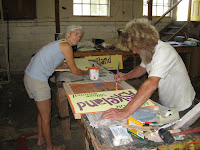 (the picture is "Roberts' Third Rule of Chaos" by an artist I found online named Dan Roberts)
(the picture is "Roberts' Third Rule of Chaos" by an artist I found online named Dan Roberts)Google's very specific search abilities make it amazingly easy to search documents for specific terms--even documents that are no longer online--and they helped me to document a precise shift, and, in my opinion, a misuse and misunderstanding of parliamentary procedures on Council that contribute to a culture of disrespect in Council meetings.
So bear with me while I explain. The minutes for Village Council Meetings for 2006-2007 are still "actively" archived online, and Google still has "cached" minutes going back even further, for a few years, till 2004, I think--even those years that are no longer "officially" kept online by our village website. So, even though the Village is not paying for the "bandwidth" or server space, which can be expensive, to continue archiving these important documents, you and I, or anyone, can use Google to get a sense of the longer history of any issue.
Here's how. Start by clicking on the words "advanced search" by the Google search bar on the Google home page, then type "fogg" by "Find results with all of the words." Look down the page and you see the word "domain," with a search bar where you can type in "yso.org/council." This means that you will have searched ONLY village council website for "fogg" and will come up only with documents and meetings archived there, or formerly archived there, related to the Fogg farm annexation debate in Yellow Springs--about 16 times. (By contrast, type "fogg" in, in regular Google search, and you get over 3 million hits!) Then, instead of clicking the title of the page, i.e., the first line of the entry, as you probably normally do, click on the word "cached" at the bottom of any entry. This will get you access to the pages that the Village no longer keeps AND the word "Fogg" will be highlighted in bright yellow so you can jump to just those portions of the minutes that focus on this issue.
Or, you can search for words like "motion died" or "no second," as I just did. In the meetings since Judith Hempfling was sworn in as the top vote-getter in the last Council election, those words have appeared repeatedly in the minutes. 7 times, to be exact, and only as a result of motions made by Judith Hempfling. These words never appear in relation to any other Council member. They typically appear when Judith is struggling to honor the democratic process--asking for Council to offer gestures of respect, sometimes big, sometimes small, for the wishes of people present. It happened during the Fogg debate, regarding the swimming pool closure, several times during the discussions of the Antioch situation, and other times.
I attended most Council meetings since the beginning of last summer, have read the minutes for all of the meetings over the last several years, and have watched Judith made three such motions that died for want of a second. I understand parliamentary procedure. Many of our village council members seem to be under the mistaken impression that to "second" a motion means that you are going to support it. It does not. It simply signals that you believe the point worthy of discussion.
If you refuse to second it, then you are essentially saying this point is unworthy of discussion. So if you read these minutes, it might look like Judith is making motions that are so unsupported, perhaps even ridiculous, that the Council did not even bother to discuss them.
However, in the situations I have witnesseded, that's not exactly what happened. Typically, Judith makes a motion, usually a motion that is designed to encourge the democratic participation of members of the community. Often there's wide support from the citizens in the room, which is sometimes packed, whose interests' and concerns the Council serves. However, although no one on Council seconds Judith's motion, the motion may be discussed nevertheless. Sometimes Judith has had to politely remind the council that she has a motion on the table with no second. Sometimes a member will explicitly explain why they are not seconding the motion. That's discussion.
All of that discussion is out of order, under Roberts Rules of Order, the rule book that Council uses to help do its work efficiently.
I say all this not because I'm generally a stickler for points of order and all that jazz; if the system is working, then it's not that important if it exactly follows to the letter some of the more arcane aspects of a Rule book that has to serve many different bodies. We mainly need the spirit of the procedures to be honored, which are designed to make discussion fair to all. (I'm aware that sometimes rule books can be used to create a kind of "priestly" feeling at meetings that effectively keeps "lay" people out, because they feel it's all too complicated and they must not be "smart enough" somehow to contribute. I'm opposed to that.)
I'm convinced things are not working well on our Council, and in these times it can be helpful to examine the ways we may not be honoring procedures to see if they offer some collective wisdom for us. If a Council member brings up an idea that is worthy of discussion, it must be seconded, even if that means the person who seconds the motion ultimately votes against it. To discuss a motion, without a second, is, quite simply, rude, uncollegial, and deeply disrespectful, as well as being against the procedures this body is supposed to be governed by. The fact that it only happens to one member, and that it seems to happen most often when that member is struggling to honor democratic processes, suggests problems on the Council.
Vote for a Change this Fall! Vote for Respect.








